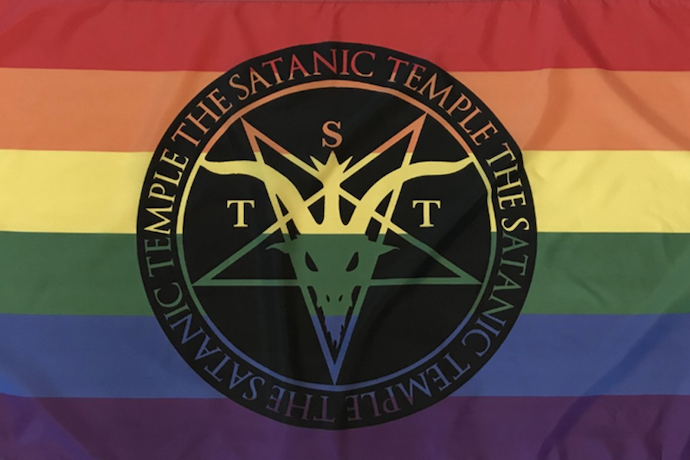This week, on the 22nd and 23rd of January, The Satanic Temple (TST) and the city of Scottsdale will meet in court to determine whether TST’s lawsuit over a retracted prayer invitation will proceed to the Ninth Circuit Court of Appeals. The lawsuit began in 2016 when Scottsdale—which recently voted to spend another $130,000 to fight the lawsuit—scheduled the Temple to give a prayer invocation, only to retroactively uninvite them and change their policies to restrict which religious groups can offer invocations. The Satanic Temple sued, Scottsdale attempted to have their case dismissed, and here we are with the case likely heading to the Ninth Circuit Court of Appeals.
Central to this case has been TST’s attorney, Stuart de Haan. Often in cases like this, the public only hears who wins. The legal principles behind the case are left unexplained, leaving pundits and spin doctors free to impose any narrative they want. So we went straight to the devil’s advocate and asked De Haan to explain his case to RD.
Why did you become a lawyer?
I had no aspirations to become a lawyer early on. I had always been fascinated with political theory and had a degree in political science. Several years and several pizza delivery jobs later, I found out there was this occupation that involved taking on the establishment. I’ve been practicing criminal defense for over a decade now.
How did you come to be involved with TST?
I became interested in TST because of the Oklahoma Ten Commandments situation. Having dabbled in Satanism and being in metal bands my whole life, the first thing I noticed was that the TST version of Baphomet did not have breasts [which, in earlier depictions, it did have]. This immediately intrigued me in that it said to me that whoever had orchestrated this was legally savvy. Getting involved in a pluralism debate at a governmental level could easily be hindered by obscenity laws and this group understood this. I was a card-carrying member right away.
I think a lot of people don’t understand that this case developed out of Greece v. Galloway (2014). Can you explain that connection?
The Greece case established a few important rules for government sponsored public prayer meeting openings. First, that these were indeed legal and spanned back to the early beginnings of the United States. Second, that there cannot be discrimination between various denominations. And third, that an invocation need not necessarily be supernatural. You’ll find that these cases are heavily fact-based and even small details of what happened could create a different outcome regarding whether or not these policies pass Constitutional muster.
Phoenix city council member Sal DiCiccio has said that The Satanic Temple’s goal is to “ban all prayer.” Is that true?
No. You will find that TST never asks for the removal or banning of religious iconography or presence in the public square. If, however, discrimination becomes a part of the process for any government entity, the only legal outcome is that public forum’s removal. This type of rhetoric is often used to spin the narrative that Satanic rights are, per se, bullying the government into submission. This is clearly disingenuous and a complete misunderstanding of what rights or equality entail. Ironically, the persecution complex of the majority will commonly be employed to maintain the status quo in which they hold the power.
In 2016 Scottsdale approved TST’s invocation, but then revoked it and implemented a new policy regarding who can give prayer invocations. Why do you think the city changed its mind?
In Scottsdale, TST claims that it was disparaged as a religion and that that was ultimately what caused the group to be uninvited, though they had originally been placed on the list as any other group. The city claims that it was our lack of ties to the community that led to the removal.
Can you explain the argument that Scottsdale’s actions amount to religious discrimination?
There are two kinds of Establishment Clause claims. The first is that the government is endorsing religion and the second is that it is disparaging a religion. Most secular organizations argue that the placement of religious monuments in isolation shows the citizens that this particular religion is given preference. Our argument is different in that by not allowing us to participate the government is in effect endorsing the majority religion.
In November 2016, mayor Jim Lane issued flyers for his re-election campaign. Among his five accomplishments was listed, “Helped stop a mockery of City hall invocations by halting a so-called ‘prayer’ by ‘Satanists.’” What do you make of this?
It would appear that discriminating against a minority religion has become a boasting point in American politics.
Some people assume TST files lawsuits in order to demand large financial settlements from defendants. What kind of remedy did you seek in your 2018 lawsuit against Scottsdale?
What we mainly seek in an Establishment Clause case is injunctive and declaratory relief. All we want is neutrally applied polices that do not discriminate and to be able to participate as any other denomination.
In August 2018 a federal judge for the Arizona district court ruled that Satanic Temple v. Scottsdale was “a case of first impression.” Can you explain what this means and why it’s significant?
That term means that no case like this has ever been brought in the region. The Ninth Circuit encompasses most of the West coast and is the largest region and includes Arizona. In effect, this case could potentially make precedent and guide future municipalities as to what is legal.
Scottsdale’s city council voted unanimously to spend $130,000 of the tax-payer’s money to litigate this case. Can you talk about how TST raised money for this case?
We sell T-shirts.
What ultimately does TST hope to achieve by demanding a right to prayer invocations?
What we hope to achieve in the short term is for us to be able to participate in the same religious way as any other organization. In the long term, we hope that cities will be more mindful of equal rights and constitutional law. Satanists are here to stay.
Is TST just a colossal hoax? And if not, why does this view remain so pervasive?
We face an immense amount of ignorant familiarity. Humans hold their prejudices near and dear to their hearts. When one’s entire religion is based on people challenging their own personal views of good, evil, and the rights of those with whom they disagree, it’s going to cause an understandable amount of discomfort and pushback that we are prepared to face.
You’ll also find that because the concept of “Religious Liberty” has been almost exclusively enjoyed by a single majority religion, the goals of minority religions are often framed as somehow phony, nefarious, or simply politically motivated. The claim that we oppose religious liberty is quite clearly a form of projection as we’ve seen many lose rights in the guise of their religious liberty-based bills. We reject the claim of conservative Christians that a sincerely held belief in discrimination means discrimination is a right protected by the first amendment.





